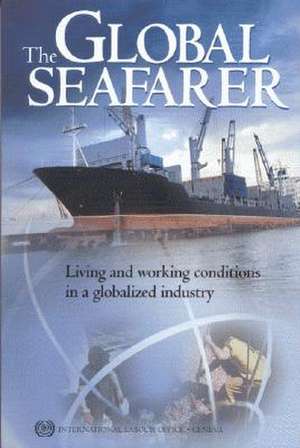The Global Seafarer: Living and Working Conditions in a Globalized Industry
Autor International Labor Officeen Limba Engleză Paperback – 14 feb 2005
This volume offers a systematic account of the effects of globalization on the shipping industry and seafarers' lives. The seafarers' labor market is changing rapidly and this study discusses the challenges encountered in recruitment practices, trade unions, and collective bargaining, as well as training, certification, and fraudulent certification. Wages, contracts, and tours of duty are also investigated, and the book includes in-depth treatment of seafarer safety and hazard exposure. Innovations such as automated engine rooms and the global maritime distress and safety system, the internationalization of ship registrations, multinational crewing and reductions in crewing levels, and the rise in ship management companies have had a profound effect on seafarers' living and working conditions. This perceptive book examines these and future issues for regulation and enforcement.
Preț: 143.43 lei
Preț vechi: 173.41 lei
-17% Nou
Puncte Express: 215
Preț estimativ în valută:
27.45€ • 29.91$ • 23.13£
27.45€ • 29.91$ • 23.13£
Comandă specială
Livrare economică 02-16 aprilie
Doresc să fiu notificat când acest titlu va fi disponibil:
Se trimite...
Preluare comenzi: 021 569.72.76
Specificații
ISBN-13: 9789221127130
ISBN-10: 9221127133
Pagini: 208
Dimensiuni: 159 x 241 x 13 mm
Greutate: 0.36 kg
Editura: Brookings Institution Press
Colecția International Labor Office
ISBN-10: 9221127133
Pagini: 208
Dimensiuni: 159 x 241 x 13 mm
Greutate: 0.36 kg
Editura: Brookings Institution Press
Colecția International Labor Office
Descriere
This volume offers a systematic account of the effects of globalization on the shipping industry and seafarers' lives. The seafarers' labor market is changing rapidly and this study discusses the challenges encountered in recruitment practices, trade unions, and collective bargaining, as well as training, certification, and fraudulent certification. Wages, contracts, and tours of duty are also investigated, and the book includes in-depth treatment of seafarer safety and hazard exposure. Innovations such as automated engine rooms and the global maritime distress and safety system, the internationalization of ship registrations, multinational crewing and reductions in crewing levels, and the rise in ship management companies have had a profound effect on seafarers' living and working conditions. This perceptive book examines these and future issues for regulation and enforcement.
